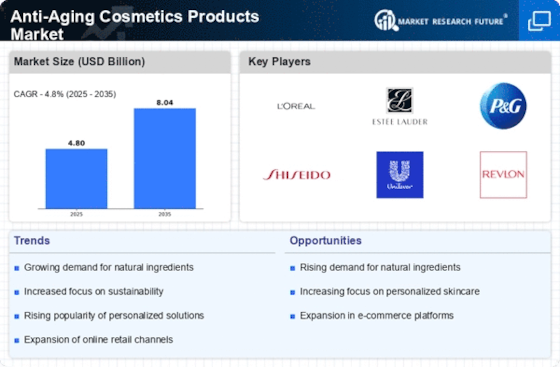Top Industry Leaders in the Anti Aging Cosmetics Products Market
The competitive landscape of the anti-aging cosmetics products market is characterized by a dynamic interplay among key players, each striving to secure a substantial share in this ever-growing sector. As of 2023, a select group of key players has emerged as influential figures in the industry, employing a range of strategies to meet the evolving demands of consumers seeking effective solutions in the anti-aging cosmetics space.
Key Players:
Unilever PLO
Allergan PLO
L'Oreal S. A
The Estee Lauder Companies Inc.
Lotus Herbals Pvt. Ltd
The Himalaya Drug Company
The Procter & Gamble Company
Kaya Limited
The Face Shop Co. Ltd
PhotoMedex, Inc.
Strategies Adopted By Anti-Aging Cosmetics Products Key Players:
Strategies adopted by these key players revolve around product innovation, brand positioning, and global market expansion. L'Oréal invests significantly in cutting-edge research to introduce new and advanced anti-aging formulations, often incorporating breakthrough ingredients. Estée Lauder Companies capitalizes on its luxury image, engaging in strategic partnerships with influencers and celebrities to reinforce brand exclusivity. Procter & Gamble leverages its extensive consumer reach, adopting marketing strategies that emphasize the effectiveness and accessibility of its anti-aging products. Shiseido emphasizes cultural relevance and authenticity, tailoring products to specific regional preferences. Revlon, known for its iconic brand, engages in marketing campaigns that highlight the timeless appeal of its anti-aging cosmetics.
Market Share Analysis:
The anti-aging cosmetics products market is influenced by factors such as product efficacy, brand recognition, pricing, and consumer trust. Companies that successfully navigate these elements, offering proven solutions backed by scientific research, tend to secure a larger market share. Additionally, strategic partnerships with dermatologists, skincare professionals, and retail channels contribute significantly to market penetration.
News & Emerging Companies:
The anti-aging cosmetics products market have gained prominence, tapping into niche markets and leveraging the growing demand for natural and clean beauty options. Startups like The Ordinary and Drunk Elephant have risen to prominence, offering transparent formulations and focusing on ingredient-driven skincare. While their market share may be comparatively modest at present, their focus on simplicity, efficacy, and ingredient transparency has resonated with a segment of consumers seeking authenticity in their skincare routine.
Industry Trends:
Industry trends highlight the ongoing commitment of companies within the anti-aging cosmetics products market to adapt to evolving consumer expectations. Investments in research and development are directed towards understanding the aging process and developing targeted solutions. Additionally, investments in digital marketing, e-commerce capabilities, and virtual try-on tools reflect the industry's response to the changing landscape of consumer shopping behaviors.
Competitive Scenario:
The anti-aging cosmetics products market reflects a dynamic equilibrium between established players and emerging disruptors, all navigating a landscape shaped by advancing skincare technologies and shifting consumer preferences. Key players maintain their dominance through extensive product portfolios, brand strength, and a global presence. Emerging companies contribute to the market's dynamism with innovative approaches, transparency in formulations, and a focus on clean beauty. The competition is further intensified by the entry of direct-to-consumer brands, specialty skincare lines, and the ongoing trend towards personalized beauty solutions.
Recent Development
The anti-aging cosmetics products market is characterized by a blend of established players and emerging disruptors, all navigating a landscape shaped by advancing skincare technologies and evolving consumer expectations. Key players maintain their market leadership through innovation, brand strength, and a global presence, while emerging companies contribute to the industry's evolution with novel approaches and transparency. As the anti-aging cosmetics products market continues to evolve, companies that can effectively integrate science-backed innovation, cater to diverse consumer preferences, and adapt to the changing retail landscape are poised for success in this competitive and continuously evolving beauty segment.











